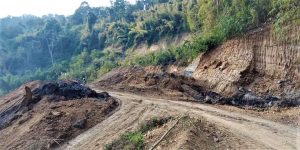The illegal mining of coal, which has continued unabated for decades in India’s northeastern state of Assam, is causing large-scale destruction to one of the country’s finest rainforests.
Seizures of trucks laden with coal dug out from the forests around Ledo-Margherita is a regular phenomenon in Assam, and one that has sometimes led a section of opposition politicians to allege that the government is involved in the racket. Inquiries have been ordered frequently. Commissions have been appointed to probe the illegal activity. These commissions have also submitted voluminous reports.
However, the pilferage has continued under the very nose of the government without the kingpins ever being nabbed. Indeed, the government often displays a total inability, even a reluctance, to check the illegal mining of coal in the eastern tip of Assam bordering Arunachal Pradesh.
The government even accepted awareness of the situation on the ground when it stated before Parliament on November 22, 2019 that the Assam government was aware of illegal coal mining at the Digboi Forest Division. Action has been initiated against some officials from the forest department for “dereliction of duty,” it said. The statement identified the forest zone of Tirap and Tipong as being impacted by illegal coal mining.
Incredible as it may seem, the government-owned North Eastern Coalfields (NEC), which was given a lease to extract coal in the region, was found to have been engaging in the activity illicitly for many years after its mining rights had expired. The Justice (Retd) B P Katakey Commission mentioned in its report that the NEC had illegally mined coal worth Rs 48.72 billion ($650 million).
There is no effective mechanism for keeping tabs on the vast forested region abutting Ledo-Margherita, which comprises several reserve forests and an elephant corridor which also extends to Arunachal Pradesh. Occasionally, the forest department and the police go on drives to check the theft but these government agencies are hamstrung by a dearth of human resources.
Tilak and Tirap are the two main coal producing collieries in Ledo-Margherita. They lie in close proximity to some villages, which facilitates the hiring of local residents for digging coal. Locals, including women and children, use sharp tools to extract coal through the so-called rat-hole method. The coal is then transported in gunny bags and head slings to specific locations to be loaded onto trucks.
On December 25, 2020, the Katakey Commission noticed rat-hole mines during a field visit to the forest region adjacent to Namdung Colliery, which is included in Saleki Proposed Reserve Forest. Heaps of freshly dug coal were seen in the area and also at the homes of people living in the vicinity.
The traders who employ the diggers operate hand-in-glove with a section of government officials, including the police, whose role has been referred to by the Katakey Commission and also mentioned in an earlier report compiled by the police.
The involvement of some politicians belonging to the ruling Bharatiya Janata Party (BJP) is an open secret in Assam. These politicians reportedly issue “entry passes” to traders for the extraction of coal. The politicians receive a cut for every truck that exits the area and the extorted amount is shared with government officials involved in the scam.
Since last year, NEC has halted coal mining in Ledo-Margherita but the high demand for it has ensured the continuation of the illicit activities by the politician-official-trader nexus.
Locals say that most of the trucks supply coal to the state’s brick kilns and tea gardens. Traders have avoided the markets outside Assam over the past several months due to increased surveillance along the inter-state borders.
Traders engaged in the illicit extraction and trade of coal equip trucks with papers necessary to avoid confiscation by officials. These papers are just receipts showing that taxes have been paid.
Another method by which the law is subverted is by overloading the trucks with coal beyond the permissible limit. Officials are bribed to turn a blind eye if the violation is detected at the weigh bridges.

































